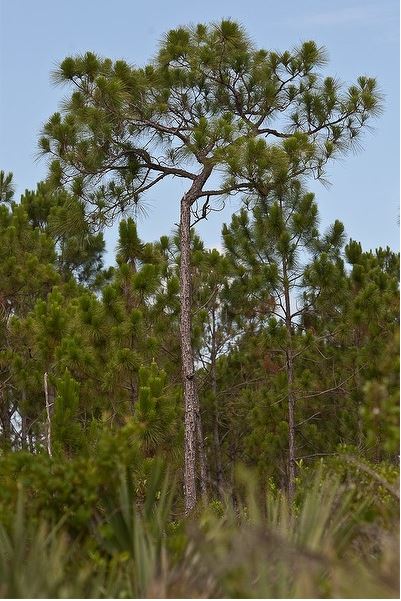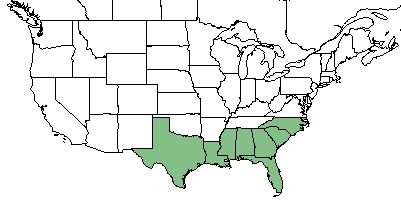Difference between revisions of "Pinus elliottii"
(→Taxonomic Notes) |
|||
| Line 19: | Line 19: | ||
}} | }} | ||
==Taxonomic Notes== | ==Taxonomic Notes== | ||
| − | Synonyms: | + | Synonyms: ''P. heterophylla'' |
Varieties: none | Varieties: none | ||
Revision as of 17:51, 17 December 2020
Common name: slash pine [1]
| Pinus elliottii | |
|---|---|

| |
| Photo by John B hosted at Bluemelon.com/poaceae | |
| Scientific classification | |
| Kingdom: | Plantae |
| Division: | Magnoliophyta - Flowering plants |
| Class: | Magnoliopsida - Dicots |
| Order: | Pinales |
| Family: | Pinaceae |
| Genus: | Pinus |
| Species: | P. elliottii |
| Binomial name | |
| Pinus elliottii Engelm. | |

| |
| Natural range of Pinus elliottii from USDA NRCS Plants Database. | |
Contents
Taxonomic Notes
Synonyms: P. heterophylla
Varieties: none
Description
P. elliottii is a perennial tree of the Pinaceae family native to North America.[2] Seedlings have tall, thin trunks with open groups of needles.[3]
Distribution
P. elliottii is found along the southeastern coast of the United States from Texas to North Carolina.[2]
Ecology
Habitat
P. elliottii proliferates in wet pine flatwoods and maritime forests.[1] Specimens have been collected from sandy soils with virgin slash pine flatwoods, hollows between stable sand dunes, on bay shore of island, mixed hardwood swamp, pine plantation, open grassy field, in dry loamy sand of sandhill flat, longleaf pine community, and pine-oak-sweet gum woods.[4]
P. elliottii responds negatively to heavy silvilculture in North Florida.[5] It also responds positively to soil disturbance by clearcutting and roller chopping in North Florida.[6]
Pinus elliottii var. elliottii is frequent and abundant in the Peninsula Xeric Sandhills, North Florida Longleaf Woodlands, North Florida Subxeric Sandhills, Xeric Flatwoods, North Florida Mesic Flatwoods, Central Florida Flatwoods/Prairies, Calcareous Savannas, North Florida Wet Flatlands, and Upper Panhandle Savannas community types as described in Carr et al. (2010).[7]
Pinus elliottii var. densa is frequent and abundant in the Central Florida Flatwoods/Prairies community type as described in Carr et al. (2010).[8]
Seed dispersal
This species is thought to be dispersed by wind.[9]
Habitat
Adapted to mesic sites.[10]
Fire ecology
P. elliottii is fire resistant, but has a low fire tolerance.[2] P. elliottii var. densa has thick bark as an adult and a 'grass' stage as a juvenile that offer resistance to fire damage.[11]
Conservation and Management
Cultivation and restoration
Photo Gallery
References and notes
- ↑ 1.0 1.1 Weakley, A. S. (2015). Flora of the Southern and Mid-Atlantic States. Chapel Hill, NC, University of North Carolina Herbarium. Cite error: Invalid
<ref>tag; name "Weakley 2015" defined multiple times with different content - ↑ 2.0 2.1 2.2 USDA Plant Database https://plants.usda.gov/core/profile?symbol=PIEL
- ↑ Moyroud R. 1996 South Florida Slash Pine Pinus ellioti variety densa Palmetto 16(4):11-12
- ↑ URL: http://herbarium.bio.fsu.edu. Last accessed: June 2018. Collectors: Andre F. Clewell, E.A. Hebb, Elbert L. Little Jr., R.K. Godfrey, Cecil Slaughter, D.B. Ward, Poppleton, A.G. Shuey, Robert Kral, Patricia Elliot, Gwynn W. Ramsey, H. Larry E. Stripling, Loran Anderson, Bruce Hansen, T. Myint, R.R> Smith, F.C. Craighead, R. Komarek. States and counties: Florida (Wakulla, Hendry, Franklin, Leon, Flagler, lake, Monroe, Martin, Liberty, Madison, Gadsden, Lee, Highlands, Dade, Osceola) Georgia (Grady)
- ↑ Conde, L.F., B.F. Swindel, and J.E. Smith. (1986). Five Years of Vegetation Changes Following Conversion of Pine Flatwoods to Pinus elliottii Plantations. Forest Ecology and Management 15(4):295-300.
- ↑ Lewis, C.E., G.W. Tanner, and W.S. Terry. (1988). Plant responses to pine management and deferred-rotation grazing in north Florida. Journal of Range Management 41(6):460-465.
- ↑ Carr, S.C., K.M. Robertson, and R.K. Peet. 2010. A vegetation classification of fire-dependent pinelands of Florida. Castanea 75:153-189.
- ↑ Carr, S.C., K.M. Robertson, and R.K. Peet. 2010. A vegetation classification of fire-dependent pinelands of Florida. Castanea 75:153-189.
- ↑ Kirkman, L. Katherine. Unpublished database of seed dispersal mode of plants found in Coastal Plain longleaf pine-grasslands of the Jones Ecological Research Center, Georgia.
- ↑ Moyroud R. 1996 South Florida Slash Pine Pinus elliottii variety densa Palmetto 16(4):11-12
- ↑ Abrahamson, W. G. and C. R. Abrahamson (1996). "Effects of Fire on Long-Unburned Florida Uplands." Journal of Vegetation Science 7(4): 565-574.